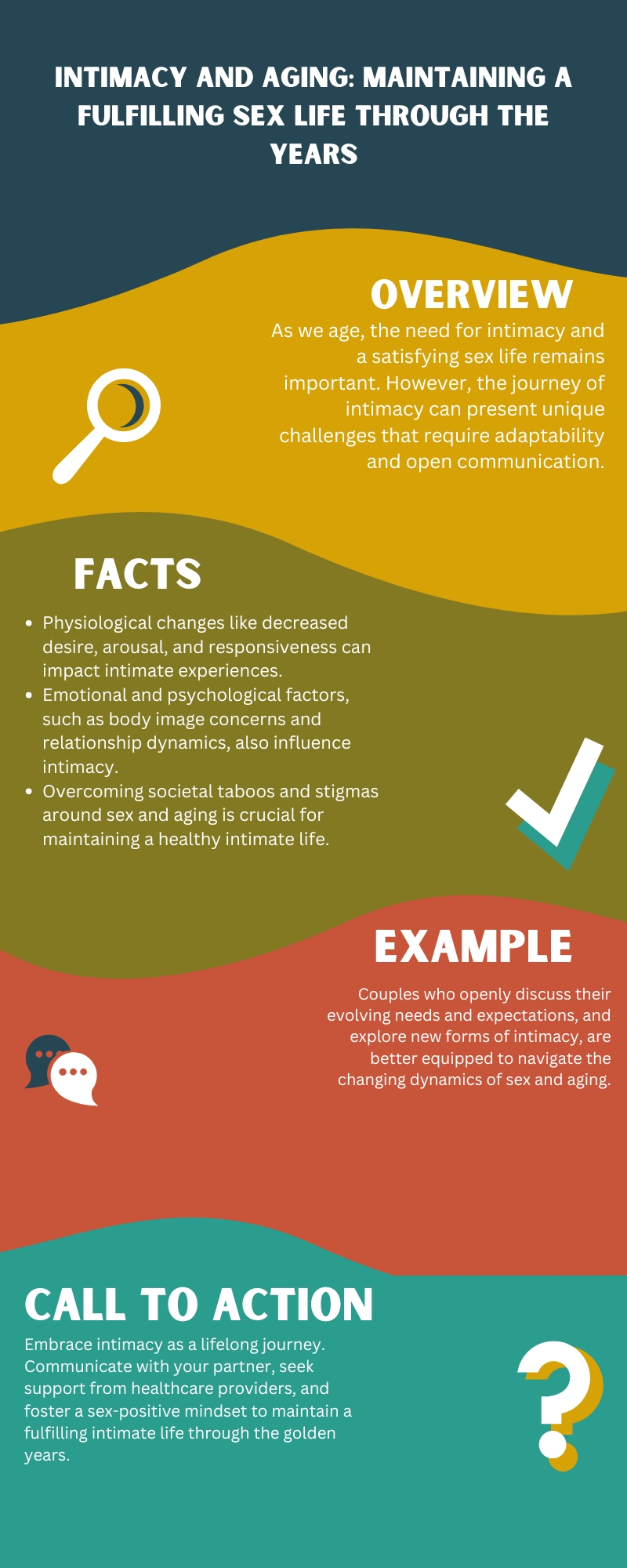As we grow older, the need for intimacy and a fulfilling sex life does not diminish. Maintaining a healthy and satisfying intimate relationship can be a vital component of overall well-being and quality of life in the later stages of life.
However, the journey of intimacy and aging can present unique challenges that require open communication, adaptability, and a willingness to explore new ways of expressing and experiencing physical and emotional closeness.
The Changing Dynamics of Sex and Intimacy with Age
1. Physiological Changes
As we age, our bodies undergo a variety of physiological changes that can impact our sexual and intimate experiences. These changes may include:
- Decreased sexual desire and arousal
- Reduced lubrication and flexibility
- Decreased sensitivity and responsiveness
- Erectile dysfunction or difficulty maintaining erection
- Changes in orgasm intensity and duration
Recognizing and understanding these natural changes can help individuals and couples adapt and find new ways to maintain a satisfying intimate life.
2. Emotional and Psychological Factors
In addition to the physical changes, aging can also bring about emotional and psychological factors that influence our intimate lives. These may include:
- Shifts in body image and self-esteem
- Changes in relationship dynamics and roles
- Concerns about performance and sexual function
- Grief and loss related to the passing of a partner
- Increased stress or anxiety about intimacy
Addressing these emotional and psychological aspects of aging and intimacy is crucial for maintaining a fulfilling sex life.

Communicating Openly and Honestly About Intimacy
| Aspect | Key Points |
|---|---|
| Discussing Needs and Expectations | – Open and honest communication is essential for managing changes in intimacy. – Couples should discuss evolving needs, desires, and expectations openly. – Focus on both physical and emotional intimacy. |
| Overcoming Taboos and Stigma | – Social stigma and taboos exist around discussing intimacy among older adults. – Challenging these preconceptions is important. – Open discussions help individuals and couples access support and resources for a fulfilling intimate life. |
Maintaining a Healthy Sex Life: Strategies and Techniques
1. Adapting to Physical Changes
As individuals experience physical changes, it is important to explore and experiment with new techniques and positions that accommodate these alterations. This may include using lubricants, incorporating assistive devices, or trying different forms of sexual activity that are less physically demanding.
2. Exploring New Forms of Intimacy
Beyond traditional sexual intercourse, older adults can explore a wide range of intimate activities that bring them physical and emotional closeness, such as cuddling, massage, mutual masturbation, and sensual touch.
3. Incorporating Aids and Assistive Devices
Various aids and assistive devices, such as vibrators, lubricants, and erectile dysfunction medications, can help individuals and couples overcome physical limitations and maintain a satisfying sex life.

The Role of Healthcare Providers in Supporting Intimacy
1. Addressing Sexual Health Concerns
Healthcare providers, such as physicians, sex therapists, and counselors, play a crucial role in supporting the sexual health and intimate lives of older adults. They can help address concerns related to physical changes, sexual dysfunction, and emotional factors that impact intimacy.
2. Recommending Resources and Support
Healthcare providers can also connect individuals and couples with educational resources, support groups, and other services that can help them navigate the challenges of intimacy and aging.

Embracing Intimacy as a Lifelong Journey
1. Celebrating the Joys of Aging
While the aging process may bring about changes in our intimate lives, it is important to recognize and celebrate the joys and advantages that come with growing older. This includes the wisdom, emotional maturity, and self-acceptance that can enhance our intimate experiences.
2. Fostering a Sex-Positive Mindset
Cultivating a sex-positive mindset, which embraces the normalcy and importance of sexuality throughout the lifespan, can help older adults overcome societal biases and embrace intimacy as a natural and fulfilling aspect of their lives.
Conclusion: Embracing Intimacy Through the Golden Years
Maintaining a fulfilling sex life and intimate relationship as we age is a journey that requires open communication, adaptability, and a willingness to explore new ways of expressing and experiencing physical and emotional closeness.
By embracing the changing dynamics of intimacy, addressing physical and emotional challenges, and seeking support from healthcare providers and resources, older adults can continue to enjoy the joys and benefits of a healthy and satisfying intimate life.
FAQs
1. How does aging impact intimacy and sexual function?
Aging brings changes like reduced desire, arousal, and responsiveness. Adapting to these changes can help maintain a fulfilling intimate life.
2. How can couples communicate about intimacy?
Openly discuss desires, concerns, and expectations. Honest conversations help partners navigate evolving needs together.
3. What role do healthcare providers play?
Healthcare professionals can address sexual health concerns, offer guidance, and connect older adults to helpful resources and support.
4. How can older adults embrace intimacy as lifelong?
Adopting a sex-positive mindset helps normalize and celebrate intimacy, empowering older adults to enjoy fulfilling relationships despite societal biases.


